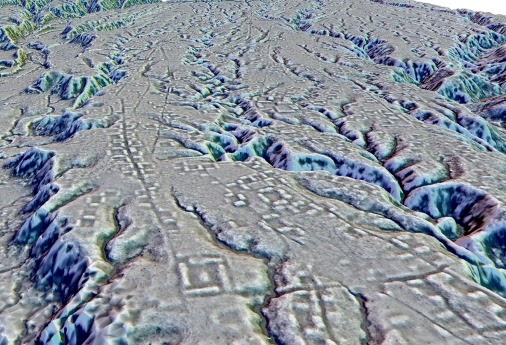last year's feature on the #evolution of #menopause in toothed #whales and humans is now in the #OpenArchives. https://proseandpassion.blogspot.com/2024/04/menopausal-mammals.html #science #FreeAccess #cetaceans #marineBiology

last year's feature on the #evolution of #menopause in toothed #whales and humans is now in the #OpenArchives. https://proseandpassion.blogspot.com/2024/04/menopausal-mammals.html #science #FreeAccess #cetaceans #marineBiology

»“Wait, not like that”: #Freeaccess and #openaccess in the age of #generativeAI. The real #threat isn’t AI using #openknowledge — it’s #AI #killing the #projects that make knowledge free.«https://www.citationneeded.news/free-and-open-access-in-the-age-of-generative-ai/?eicker.news #tech #media

last year's feature on green #cities (past, present, future) is now in the #OpenArchives - #FreeAccess for all: https://proseandpassion.blogspot.com/2024/02/urbanism-now-and-then.html #science #urbanism #archaeology #anthropology #CurrentBiology

AMERICAN NINJA V LET’S GOOOO
Quoting @BigJackBrass: https://social.vivaldi.net/@BigJackBrass/113952670354874762 #retoot
Last year's feature on the long history of #humans #hunting and otherwise bothering #elephants is now in the #OpenArchives: https://proseandpassion.blogspot.com/2024/01/the-long-history-of-elephants-suffering.html #FreeAccess #science #ecology
11/
[1] Goh, D.H., Ng, P.K., 2007. Link decay in leading information science journals. Journal of the American Society for Information Science and Technology 58 (1), 15–24. https://doi.org/10.1002/asi.20513
(#FreeAccess: https://scholar.google.com/scholar?cluster=4291520808481480763 )
[2] Saberi, M.K., Abedi, H., 2012. Accessibility and decay of web citations in five open access ISI journals. Internet Research 22 (2), 234–247. https://doi.org/10.1108/10662241211214584
(https://scholar.google.com/scholar?cluster=4408705938273344234 )
#Journals | #Photoniques
Read the exclusive interview with Anne L'Huillier, Nobel Prize in Physics 2023, in the latest issue of 'Photoniques' https://bit.ly/3Vz6hpz
#FreeAccess
#NobelPrize
#Physics
#EDPSciences
@science @academicsunite @academicchatter #EDPSciences
#ScienceMastodon
The Reception of the Marduk Prophecy in Seventh-Century B.C. Nineveh
“This article discusses how the Marduk Prophecy was read and re-interpreted in Nineveh at that time. Between the Marduk Prophecy and the royal literature during the reign of Ashurbanipal, the following common themes can be recognized: (1) reconstruction of the Babylonian temples, above all Esagil; (2) conquest of Elam; and (3) fulfillment of divine prophecies. On the basis of these, the author proposes that in the seventh-century Nineveh the Marduk Prophecy was regarded as an authentic prophecy predicting the achievements of Ashurbanipal, and that this is the main reason why this text was read at his court.”
Takuma SUGIE, The Reception of the Marduk Prophecy in Seventh-Century B.C. Nineveh, Orient, 2014, Volume 49, Pages 107-113, Released on J-STAGE April 03, 2017, Online ISSN 1884-1392, Print ISSN 0473-3851, https://doi.org/10.5356/orient.49.107.
#FreeAccess #Article #History #Histodon #Histodons #Ancient #Antiquity #Antiquidons #Orient #MiddleEast #NearEast #Marduk #Nebuchadnezzar #Ashurbanipal #Nineveh #Academia #Academic #Academics @histodon @histodons @antiquidons
The article “Travelling Concepts” by Jan Ifversen opens the latest issue (19/1) and invites us on a journey through Margrit Pernau’s extensive intellectual work and her invaluable role as the journal's longest-serving editor. Explore the fantastic article #freeaccess: https://doi.org/10.3167/choc.2024.190101
Edinburgh University Press has included 25 literary studies journals in its #OpenAccess campaign running this January.
This includes free access to #CrimeFictionStudies, #GothicStudies, #JournalOfInklingsStudies, #Romanticism, #Victoriographies, and many others!
Browse them all here: https://www.euppublishing.com/literarystudies
Today I learned that if you are a member of @deichman you can get access to over five-thousand newspapers and magazines for free, digitally via pressreader.com
Scientific study shows we are not addicted to mobile phones but to the social interaction they facilitate | University of Granada https://www.ugr.es/en/about/news/not-addicted-mobile-phones-social-interaction-they-facilitate
Social Expectancy Increases Skin Conductance Response in Mobile Instant Messaging Users | Psicothema https://www.psicothema.com/pi?pii=4823
#freeaccess
All The #PublicLibraries Offering #FreeAccess to #BannedBooks: A Comprehensive Guide
https://bookriot.com/public-libraries-offering-free-access-to-banned-books/
Chiara Caporuscio reviews Frame It Again by Jose Luis Bermudez #FreeAccess https://doi.org/10.1080/09515089.2022.2158072 @philosophy #rationality #framing
Naomi Kloosterboer reviews #Extremism by Quassim Cassam #FreeAccess #bookreviews @philosophy @politics
New! Special Issue on #COVID19 Collective #Irrationalities Part 2. Guest Editors Kengo Miyazono and Rie Iizuka https://www.tandfonline.com/toc/cphp20/36/6 @philosophy @psychology Six articles #OpenAccess now and book reviews will be #FreeAccess from next week!
I saw a post on facebook about alternative search engines to Google. But apparently because facebook censored it, it had to be reshared as a series of screenshots without clickable links. Why? Does Meta have an agreement with Alphabet to censor competition? Or is it that Meta sees some of these search engines as potentially violating copyright and taking overzealous legal precautions? Anyway, maybe this is a way #fediverse can do better. Here is a list of said search engines and their specialities...
http://www.refseek.com - A search engine for academic resources. More than a billion encyclopedias, monographs and magazines.
http://www.worldcat.org - A search engine for the contents of 20,000 world libraries. Find the nearest library for that rare book.
https://link.springer.com - 10 million scientific documents: books, articles, research records.
http://bioline.org - Library of bioscience journals published in developing countries.
http://repec.org - 4 million publications on economics and related sciences collated by volunteers from 102 countries.
http://www.science.gov - American state search engine for 2200+ scientific sites. More than 200 million articles indexed.
http://www.pdfdrive.com - Largest site for free download of books in pdf format.
http://www.base-search.net - search site for academic research texts. More than 100 million scientific documents, over 70% of which are free.
#SearchEngines #Science #academia #research #FreeAccess
Mark Sprevak’s review of Anil Seth’s book, Being You, is now available for everyone to read! https://doi.org/10.1080/09515089.2022.2092465 #FreeAccess @philosophy @philosophyofmind
The (slow) thread collecting last year's features in #CurrentBiology as they move into the #OpenArchives (one year after publication) starts here. #ProseAndPassion #Science #ScienceWriter #ScienceJournalism #biology #ecology #FreeAccess
Unfortunately, the paper is #NotOpenAccess. For those of you frustrated by #paywalls (same here!), feel free to e-mail me and I’ll help out! #PayWallProblems #OpenAccess #FreeAccess (6/6)